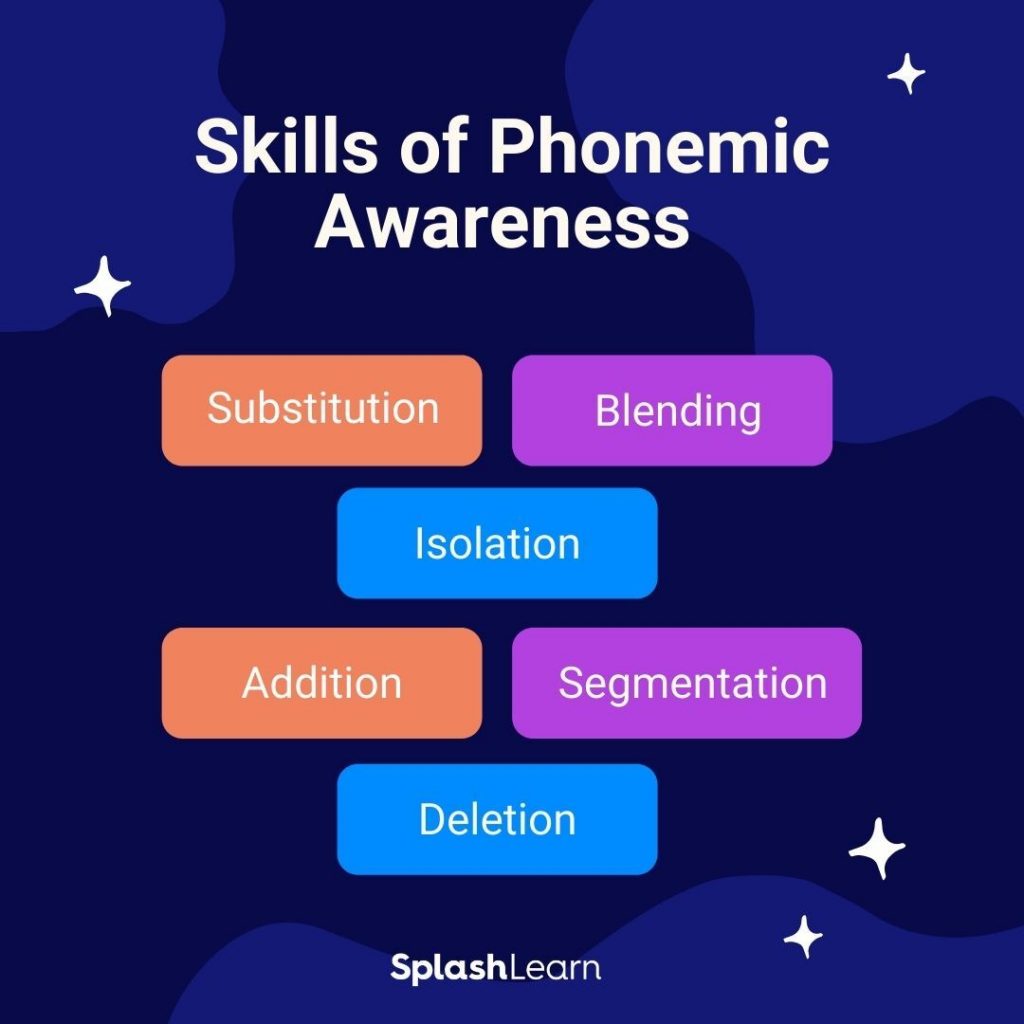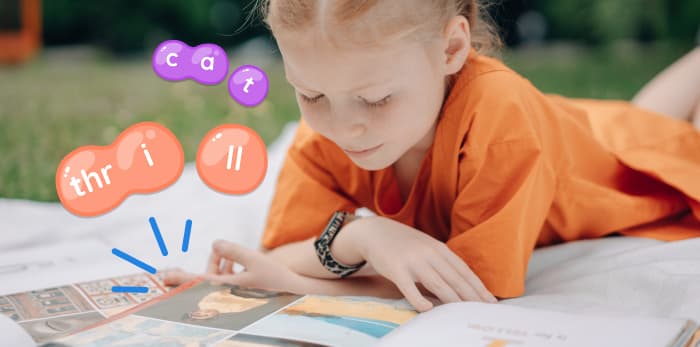Before a child can learn to read printed words, they need to know how the sounds in words work.
Kids must understand that spoken words comprise sequences of speech sounds or phonemes.
Math & ELA | PreK To Grade 5
Kids see fun.
You see real learning outcomes.
Watch your kids fall in love with math & reading through our scientifically designed curriculum.
Parents, try for free Teachers, use for free
What are phonemes?
In the simplest words, phonemes are the smallest units of sound in a spoken word that make a difference in the meaning of that word.
For example, the word ‘hat’ has three phonemes: /h/, /a/, and /t/. Changing the first phoneme /h/ with /c/ will change the word to ‘cat’ and thus also change the meaning.
Similarly, the word ‘fish’ has three phonemes, /f/ /i/ /sh/, and the word ‘sheep’ has three phonemes, /sh/ /ee/ /p/.

Phonemic awareness is a subset of phonological awareness.
What is Phonemic Awareness?
Phonemic awareness consists of three pieces. The first piece is the phoneme, the linguistic unit; the second concerns the explicit awareness of this unit, and the third involves the ability to manipulate this unit.
Why is Phonemic Awareness Important?
Phonemic awareness doesn’t involve the use of print, but it is still one of the most important building blocks to develop skills in reading and spelling.
Understanding the connection that words are made up of phonemes and that phonemes are represented by graphemes or letters is a vital skill for understanding print.
Children who can identify and process phonemes rapidly can read more fluently because of this rapid processing.

Fluent reading depends on the students developing their phonemic awareness to the point of automaticity and thus easily comprehending what they read. Students rely on inefficient decoding methods and coping strategies like memorization without this understanding.
Related Reading: Sight Words for First Graders That Kids Can Easily Learn
While these alternate methods enable kids to begin reading, as the text gets complex, it becomes challenging for the students to comprehend what they are reading when they are too focused on decoding.
What Makes it Difficult Then?
Acquiring phonemic awareness is difficult simply because hearing the individual sounds within a word is difficult.
It is because when we speak, we naturally and effortlessly blend all the sounds together to say and hear the overall word. This makes it difficult for children to recognize the individual sounds of the particular word.

For example, a child would say and hear the word “puppy” as one word /puppy/ and does not recognize or distinguish the separate sounds /p/ /u/ /p/ /ee/ that make up the word.
What skills does phonemic awareness involve?
An effective phonemic instruction program focuses on all three pieces of phonemic instruction. Thus, it should teach students to explicitly recognize, understand, and manipulate sound in the spoken language.

It addresses six phonemic skills:
- Students recognize individual sounds in a given word. For example, the word ‘set’ begins with /s/ and ends with /t/. (Isolation)
- Students listen to a sequence of sounds spoken separately and combine them. For example /s/ + /e/ + /t/ =’set’. (Blending)
- Students break the words they hear into individual sounds and count the number of sounds they hear. For example, ‘set’ has three sounds. (Segmentation)
- Students delete one phoneme from a word to create a new word. For example, delete /t/ in ‘pant’ to make ‘pan’ (Deletion)
- Students make a new word by adding a phoneme to an existing word. For example, change ‘pan’ to ‘pant’ by adding the phoneme /t/ at the end. (Addition)
- Students substitute one phoneme for another. For example,/i/ is substituted by /a/ to make ‘strip’ to ‘strap’ (Substitution)
What are Some Strategies to Teach Phonemic Awareness?
Now that we know what phonemic awareness is and why it is important, you are probably wondering what you, as a parent, can do to help your child become a better reader.
Many activities can help a child build sound skills.
Please note: Children must hear a lot of modeling of the six phonemic skills discussed above before they are asked to do it themselves.
Listen and speak
Read and sing silly songs and poems that bring attention to the sounds of the language.
Play phoneme games
Take turns thinking of a word and segmenting it into its sounds. Then, ask to switch any one phoneme to make a new word. Similarly, practice adding and deleting phonemes to create words.
Play a Rhyming Game
Take turns thinking of words that rhyme with cat, dog, pig, pin, etc. Talk about what makes them rhyme.
Break it down
This strategy can be applied to a lot of different games. Ask the child to touch different parts of their body. For example, can you touch your “h-ea-d” or “ch-ee-k”? This can also be done with objects. Can you touch a “ch-air” or “c-oa-t”?
Sound jump
Say a word, and the child jumps forward for each phoneme in the word.
Here are some more tips for teaching phonemic awareness to your child:
- Maintain a playful attitude and turn the teaching time into game time.
- Do a small bit each day. You will be surprised how much can be mastered by putting in 10 minutes daily.
- Make sure to stop when your child is getting frustrated and try to end on a positive note.
- Taking about a year to practice is not out of the ordinary.
- Repeat sounds and words as often as your child needs to hear them.
Now that you know the importance of phonemic awareness, here are some other activities that will help your child in becoming a fluent reader. Whatever you do, remember to keep the activities short and fun. If your child finds one activity too boring, try doing something else.
























